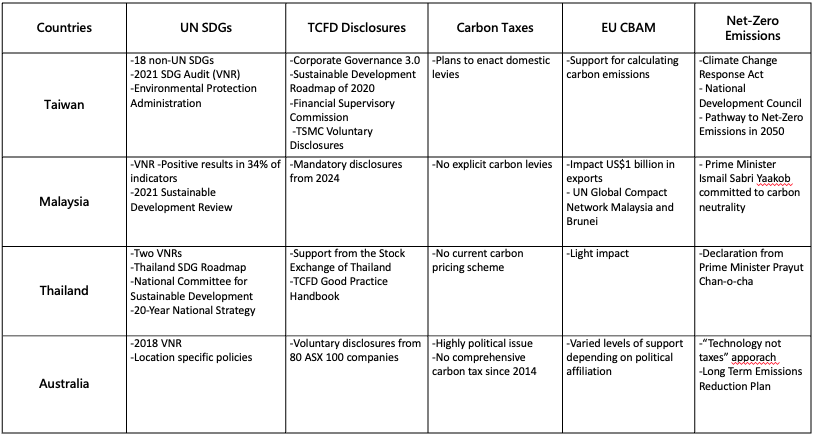Future Collaboration
Taiwan is well-positioned to collaborate with other countries on sustainability initiatives. Due to its strengths in ICT, AI, and computing, Taiwan has the capacity to promote best practices in tracking and analyzing the progress of individual UN SDG indicators. International collaboration on strengthening information collection procedures will bolster the efficacy of the UN SDGs by allowing public institutions to make sustainable policy decisions based on the most accurate available data. Moreover, through promoting the results of its Voluntary National Reviews (VNR), Taiwan can support international norms regarding the necessity of compiling comprehensive sustainability information.
In addition, Taiwan has a rich civic sector that spans across a wide range of human rights issues. Collaborating with other countries that also enjoy high rates of civic participation such as Australia has the potential to inspire further grassroots participation in each individual SDG. In addition, such collaboration could help expand the scope of SDG indicators to reflect regional and local concerns while making sustainability efforts more relevant to people across society. For instance, Taiwanese and Australian civic groups related to gender equality could ensure SDG indicators extend beyond male/female binaries to ensure transgender representation in national-level institutions. Likewise, diversifying indicators involved in social welfare, literacy, and environmental preservation would more accurately reflect the interests of indigenous communities. Through increasing the number of indicators, strengthening data collection, and inspiring further civic participation, Taiwan’s SDGs will further serve as comprehensive benchmarks spanning from social equity to environmental protection.

Publishing and promoting sustainability efforts will also show the international community that Taiwan is aligned with sustainability norms. Even though it is barred from direct participation in international events such as COP 27, Taiwan can collaborate with its like-minded partners in individual net-zero efforts (MOFA, 2022). Officially supporting EU CBAM has been seen as a positive step towards achieving net-zero. Widespread advocacy on behalf of CBAM would generate momentum towards achieving net-zero by 2050 through demonstrating that the world’s leading economies have a mutual desire to curb carbon leaking.
Furthermore, researching the efficacy of instating CBAM outside the EU could ensure that carbon leaking doesn’t impact Taiwan’s main imports such as minerals, machinery, chemicals, and base metals (MOF, 2022). Unlike the EU, Taiwan might not manufacture a domestic equivalent of certain products, but could impose levies on importers that fail to meet reasonable emission standards. The proceeds from such a levy could be used to support sustainability initiatives such as research into green energy and climate regulation frameworks. By supporting the EU CBAM and potentially enacting its own, Taiwan would bolster the sentiment that sustainability initiatives can align with free trade and economic growth.
Even though Taiwan hasn’t enacted its own CBAM, the country currently has legislated progressive mandates on TCFD disclosures (FSC, 2020). In the future, Taiwan could expand the scope of such disclosures to align with the most stringent international standards and include all listed companies, licensed insurers, and large banks (MFE, 2022). Even though many Taiwanese companies are voluntarily providing reports, a national-level mandate would promote further standardization in data collection and disclosure.
Moreover, leading private investment firms and public environmental institutions have both stated that investors will support companies with high sustainability and ESG ratings in the near future. Mandating further TCFD disclosures would bolster international investment by providing reliable and regular climate-related information on Taiwanese companies. Bullish investment in sustainable companies with reliable climate reporting would provide greater incentives for firms to enhance emissions reduction efforts as well as monitor natural resource consumption. In addition to widespread reporting on private sector climate-related financial risks, the central government could also provide incentives and rewards to companies that have the best year-over-year performance in certain TCFD-supported benchmarks.
An even more comprehensive approach to curbing emissions would include carbon taxes that align with the most rigorous international standards. The OCED has estimated that all emissions must be taxed to EUR 120 per ton of CO2 by 2030 to achieve carbon neutrality by 2050 (OECD, 2021). By using the OCED recommended carbon tax, countries can demonstrate their commitment to reaching net-zero through an internationally recognized benchmark. Moreover, legislation such as the upcoming Climate Change Response Act show that Taiwan is dedicated to creating a legal framework that encourages the private sector to cut emissions.
Such climate legislation is being developed in tandem with green technology and energy. Taiwan has already committed itself to investing heavily in sustainable technology development through the Six Core Strategic Industries. In addition, Taiwan has demonstrated potential interest in further partnering with other countries on developing ongoing projects in hydrogen, hydropower, and geothermal energy (TETDC, 2022). There is space within this sector for international public-private collaboration to promote economic growth while combating climate change.
More and more of the international community sees the urgency of such collaboration to achieve net-zero by normalizing regulation such as CBAM, climate-related risk disclosures, carbon taxes, and sustainability initiatives. It will take an overwhelming majority of major economies to displace longstanding attitudes that see development and environmental protection as mutually exclusive. By streamlining sustainability efforts, countries around the world will inspire greater confidence that it is possible to address the impacts of climate change while ensuring equitable economic development.
Projects, relevant agencies, policies, and goals of New Southbound countries in sustainable development and carbon reduction

-
Pic:Projects, relevant agencies, policies, and goals of New Southbound countries in sustainable development and carbon reduction
-
Updated:January 2023
References